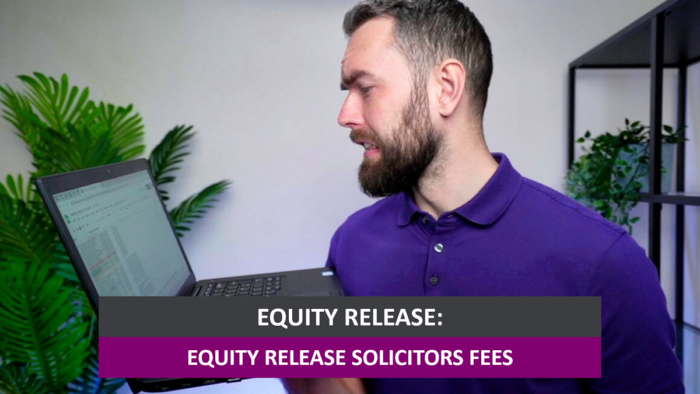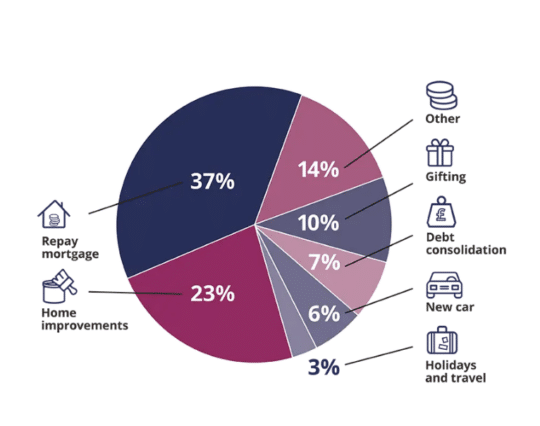Equity Release Solicitors Fees – How Much Will It Cost Me?
Our preferred equity release adviser is Age Partnership. For free and impartial money advice you can visit MoneyHelper.

Our preferred equity release adviser is Age Partnership. For free and impartial money advice you can visit MoneyHelper.
If you’re curious about equity release and the cost of legal help, you’re in the right place. Each month, over 7,000 people visit our website to learn about equity release. In this article, we’ll explain:
- What equity release is and why people choose it.
- How to understand if you’re eligible for equity release.
- What the main two types of equity release are.
- The role of a solicitor in the equity release process and their fees.
- Important things to consider before deciding on equity release.
Equity release can seem tricky. Many people worry about the fees and if their home is at risk. But don’t worry, we understand these concerns. Our website is here to make things clear and simple for you.
Why do people choose equity release?
Equity release can be an advantageous way to secure a cash lump sum in later life and be used to pay for retirement. Some of the popular reasons people decide to use equity release are to go on frequent holidays, pay for private healthcare services, complete home improvements or to gift the money to family members, as a sort of early inheritance.
The main two types of equity release explained
As stated earlier, there are two equity release products used in the UK. A lifetime mortgage is the most used equity release scheme, but another equity release option is a home reversion plan. Only consider either equity release plan from a lender that is authorised and regulated by the Financial Conduct Authority.
- Lifetime mortgage
A lifetime mortgage is an equity release loan that charges the homeowner interest on the amount of equity they release. The homeowner is not required to make repayment on the loan amount or the interest, so the interest just keeps building up each month to make the total amount owed grow. Homeowners may be allowed to make voluntary interest repayments to prevent the debt from escalating.
Once the last surviving homeowner dies or moves into care, the total debt is owed through the sale of the property.
- Home reversion plan
A home reversion equity release scheme swaps a percentage of equity as a loan today for a greater percentage of the property’s sale value. For example, you may release £50,000 from a £200,000 property (25% equity) but have to repay 75% of the sale proceeds when the time comes for the debt to be repaid. This would mean repaying £150,000 if the property value remained the same.
How equity release could help
More than 2 million people have used Age Partnership to release equity since 2004.
How your money is up to you, but here’s what their customers do…
Find out how much equity you could release by clicking the button below.
In partnership with Age Partnership.
Do you need to receive financial advice first?
Equity release is a huge decision that can be unaffordable to get out of once you have committed. For this reason, it is imperative that you receive equity release advice before making a decision. This advice should explain the full projected costs, the effects of equity release on other things such as means-tested benefits etc., and explore alternative solutions first.
In some cases, it’s also recommended to look into getting an equity release with a lasting power of attorney to protect yourself and your assets in the event that you’re in no condition to decide over the property at some point.
Many lenders offer homeowners the chance to use their own financial advisers, who should operate with professionalism and not push you to choose their lender’s lifetime mortgages or other plans. Alternatively, you can use an independent equity release adviser not connected to a lender.
Most equity release advice services charge a percentage of the loan you wish to take out as a fee upon application. This is usually between 1-4% of the loan. But there are others that charge a fixed fee of around £900, which could be financially beneficial if you’re trying to get a larger loan.
Do you need a solicitor for equity release?
On top of financial advice, you also need to receive legal advice to act on your behalf throughout the process of applying for equity release. This will protect you and give you additional peace of mind.
Join thousands of others who release equity
Age Partnership have helped over 2 million people release equity from their home.

Mrs Wareham
“I am more than pleased to have taken out Equity Release with Age Partnership.”
Reviews shown are for Age Partnership. Search powered by Age Partnership.
Do you have to have a solicitor for equity release?
The Equity Release Council makes it mandatory that homeowners must receive legal advice before pursuing an application for lifetime mortgages or other equity release plans.
This is mandatory to carry out legal tasks during the process, but also to help prevent homeowners from falling victim to any rogue financial advisers who wrongfully promote equity release.
You can read stories about mis-sold equity release here.
Can I use any solicitor for equity release?
You may not be able to use your local or family lawyers to help with the equity release process. The Equity Release Council states that only law firms with at least four practising lawyers can provide equity release legal advice. If your local law firm has less than four lawyers, you’ll need to look elsewhere.
You should also prioritise lawyers who have experience with the equity release process or even specialise in this area. Many specialising financial advisers frequently will be able to point you in the direction of competent equity release solicitors.
» TAKE ACTION NOW: Find out how much equity you could release
How much do solicitors charge for equity release?
Equity release solicitor fees are around £1,000 including VAT to cover the standard scope of work involved with an equity release application. Prices can vary between locations and law firms, so you may want to do some research to find cost-effective deals without sacrificing on the quality of service.
How much does it cost to release equity?
The cost of services from equity release advisers and equity release solicitors will cost around £2,000 at an absolute minimum. If you are taking out a larger loan and paying your adviser a percentage of the loan amount, these costs can be significantly more.
There may be additional costs you have to pay in regards to the application, often relating to admin costs, an application fee and property valuation fees.
How to choose equity release advice
Homeowners should only choose financial advisers that specialise in equity release. The adviser they use must be authorised and regulated by the Financial Conduct Authority, and preferably they should be members of the Equity Release Council.
Will a lifetime mortgage stop my state pension?
A common concern is that releasing a lump sum of your home equity will stop you from claiming a state pension. The basic state pension is not a means-tested benefit – i.e. it does not take into account your wealth to determine eligibility – and it will therefore not be taken away from you or reduced just because you receive a large loan.
However, there are a handful of means-tested benefits which could be taken away or reduced when your wealth increases, such as Universal Credit, Council Tax Reductions and Pension Credit payments, which are used to top-up the State Pension for low-income individuals.
Is equity release a good idea?
The only way to know for certain if equity release is a good idea for you is to source competent and professional equity release advice and legal counsel. You should start by doing your own research, which is why we have created lots of easy-to-read equity release content.


